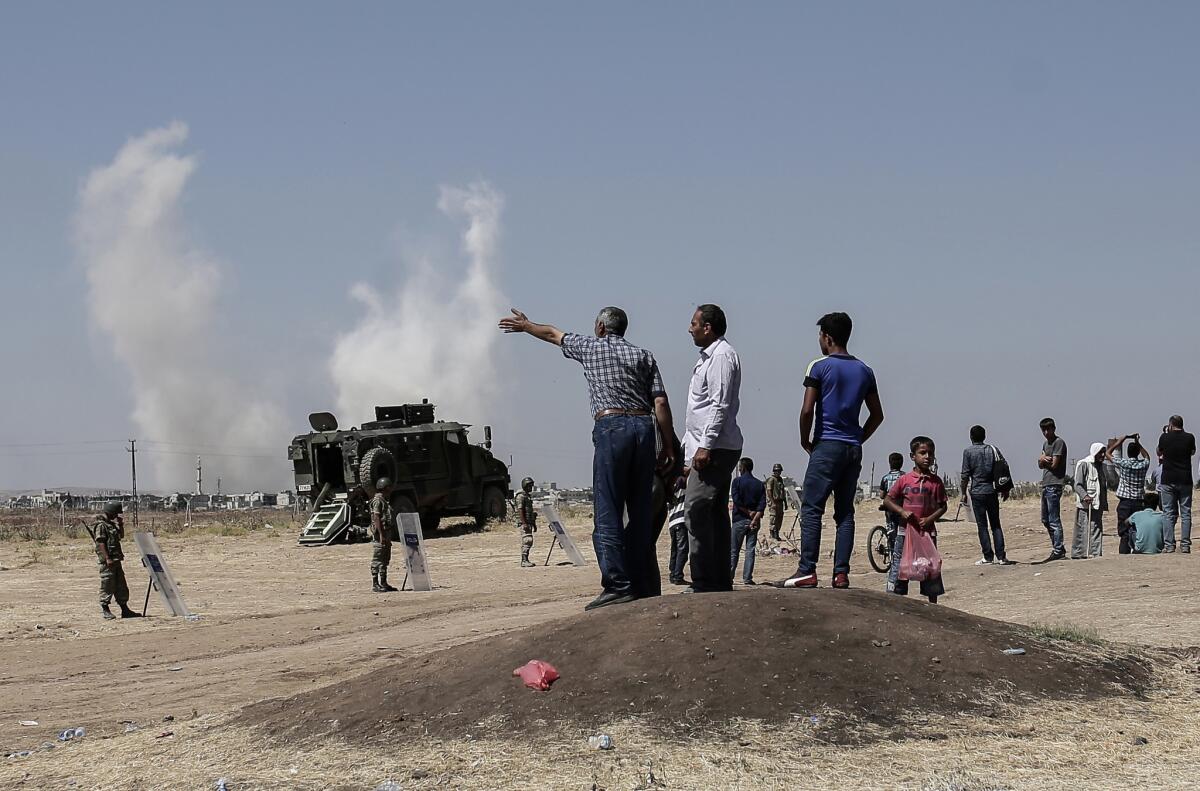Islamic State militants routed from Syria border city

People standing on the Turkish side of the border with Syria, on the outskirts of Suruc, Turkey, watch as smoke rises over Kobani, in Syria, on Saturday.
- Share via
Reporting from Cairo — Kurdish fighters in the Syrian border city of Kobani, backed by U.S.-led airstrikes, said Saturday they had expelled Islamic State militants who went on a killing spree months after having been routed by Kurdish forces.
The Sunni extremists blasted their way into Kobani, just south of the Turkish border, on Thursday with a series of car bombs, seizing a school and using it as a springboard for apparent revenge attacks. More than 200 people were killed, many of them civilians including women and children, according to activists. The ultimate toll could more than double once bodies in homes and structures are recovered, the activists said after the town had been re-secured.
Kobani assumed outsized significance last year when Islamic State besieged it for months before being driven back in January. Along the way, the city became a symbol of Kurdish defenders’ determination to fight off the jihadists, and of the Kurds’ role as the most reliable ground fighters allied with the U.S.-led coalition confronting Islamic State in Syria and Iraq.
Activist Mustafa Ebdi, speaking by phone from Kobani, said at least 250 people were killed during the three-day incursion, a count that could grow to 500, he said. On Saturday, the main Kurdish militia, known as the YPG, blew up the school where Islamic State fighters had been holed up and ejected them from five other areas, he said.
The YPG, also known as the People’s Protection Units, is a militia tasked with protecting the Kurdish minority amid Syria’s multi-sided civil war. But its presence along the Turkish frontier has infuriated Turkey. The Ankara government considers the force a close cousin of what it deems “terrorists” of the Kurdish Workers’ Party or PKK, which battled the Turkish state for decades.
In September, the U.S-led military coalition, in coordination with YPG fighters on the ground, launched withering airstrikes to roll back Islamic State’s presence in wide swaths of Iraq and Syria. U.S planes kept up an intense barrage as the group pressed its attack on Kobani.
In January, with Kobani reduced to little more than rubble, Islamic State withdrew. But its renewed raid on Kobani may have been meant to surprise and demoralize Kurdish forces, who were buoyed by victory earlier this month in another border town, Tal Abyad.
That battle helped Kurds unite territory under their control and cut off an important supply route Islamic State had used between the Turkish border and its de facto capital, Raqaa, 50 miles to the south.
Although driven from Kobani, Islamic State fighters continued to press an offensive against government-held areas in the northeastern Syrian city of Hasaka, which is jointly held by troops loyal to President Bashar Assad and Kurdish forces. The Reuters news agency reported the government had appealed to residents to take up arms to defend the city.
The U.S.-led coalition said Saturday it had staged 14 airstrikes against Islamic State positions in Syria since Tuesday, including four near Kobani, five near Raqaa and two near Hasaka.
laura.king@latimes.com
Special correspondent Bulos reported from Limassol, Cyprus, and staff writer King from Cairo.
More to Read
Sign up for Essential California
The most important California stories and recommendations in your inbox every morning.
You may occasionally receive promotional content from the Los Angeles Times.












